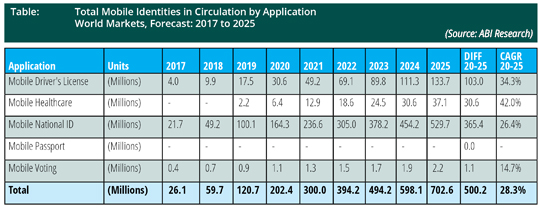Breaking the Shackles of Online Identity Dogmatism
|
NEWS
|
The adoption of digital identity across the United Kingdom seems set for an upturn, with plans to update existing laws and a new set of guiding principles for policy development. British citizens have historically been plagued with dogmatic and convoluted access to online government services, which is a significant inhibitor to those who require them. The push for digital identities has come after approximately 1.4 million citizens out of 2.6 million applicants needed to pass through Her Majesty's Revenue and Customs’ (HMRC) identity verification service to claim benefits under the Self-Employment Income Support Scheme since its inception on May 13, 2020. The need to expedite such a journey is quite apparent with an increasing number of online services gated behind lengthy verification procedures, including purchasing age-restricted items online, registering at a new doctor’s office, or updating personal details on credentials such as drivers’ licenses.
These procedures are certainly needed to ensure the risk of compromise to citizens’ identities is reduced as much as possible. Figures for 2019 show more than a 30% increase in identity fraud over the past 5 years. This sparked the debate about introducing digital identities to the United Kingdom, with the Digital Identity Strategy Board publishing six principles to strengthen digital identity delivery and policy in the United Kingdom:
- Privacy
- Transparency
- Inclusivity
- Interoperability
- Proportionality
- Good governance
Secure checks would also need to be made against government back-end databases to verify information. The Document Checking Service Pilot was launched by the U.K. government to provide citizens with secure access to digital services that require identity checks, such as online mortgage applications, financial services, and recruitment onboarding.
Why Digital, Why Now?
|
IMPACT
|
The United Kingdom has had an unsuccessful history when it comes to implementing new forms of identity for its citizens. When the incumbent government elected to shut down its national ID cards and database program in 2010, it left the United Kingdom as one of the last developed Western economies not to have such an identity scheme. At the time, this seemed a triumph for civil liberties campaigners, but is now perceived as a significant pain point in expanding the digital economy and improving public services.
COVID-19 has only accelerated the growth of mobile and digital identities across the world as governments urgently seek to provide citizens with an end-to-end touchless experience and access to services 24/7. The most efficient solution is to simply reduce the prevalence of physical in-person interactions through the digitization of credentials and identities, and extending these identities to the private sector. Governments in the 21st century have been needing to pandemic-proof themselves in case such an event were to happen for a long time. Now, in the middle of the COVID-19 pandemic, this need is greater than ever.
However, the primary inhibitor that ended the U.K. government’s plans to issue a national ID card was the deep-rooted mistrust among citizens about the use of their personal data, which led to a significant unrest. This same private conservatism will see the government’s digital identity scheme meet a premature end if it cannot ensure that citizens will maintain control of their data, with whom the data are shared, and what they are allowed (and not allowed) to do with the data.
COVID-19 Is Accelerating Adoption of Mobile Identities
|
RECOMMENDATIONS
|
Elsewhere, the ongoing pandemic is causing a surge in mobile and digital identities. While the physical government ID market struggles in the wake of the COVID-19 pandemic, (with the e-passport shipments market, in particular, falling by -34.9% in 2020), mobile credentials have seen a surge in adoption by governments looking to use a mobile credential as a platform to streamline Government-to-Citizen (G2C) and Citizen-to-Government (C2G) services, while creating end-to-end touchless service experiences through contactless technologies.
The U.S. Real ID Act is helping drive the mobile driver’s license market as smart driver’s license issuance lends itself to a digital companion. This fulfils the aforementioned necessary requirement for a contact-free platform to access government services and ensure compliance with roadside checks. Brazil will also follow suit in 2022 with a digital driver’s license as a companion to the smart credential.
Digital national IDs in circulation will continue to be, by far, the most widespread digital credential, occupying 81% of the market in 2020. Digital healthcare credentials are continuing to gain traction in 2020 in the wake of the COVID-19 pandemic, with a mobile healthcare program being initiated in Australia that allows citizens to store their healthcare cards in a digital wallet. Many regions tend to integrate mobile healthcare with mID (e.g., the Estonian model), meaning penetration rates can be low in some regions. Also, on the horizon is that of the digital identity wallet, providing citizens with a trusted all-in-one environment to secure their identities and derived credentials, while providing absolute control over their data.
The United Kingdom clearly has myriad sources from which to draw upon a solution for digital identities as it relates to technical specifications and delivery. However, as is typically the case in the United Kingdom, the rate-determining step will be the obfuscation and delay that occurs on the political side of the equation, as well as unnecessary inflexibility on the standardization side, which the United Kingdom has run afoul of in the past.

